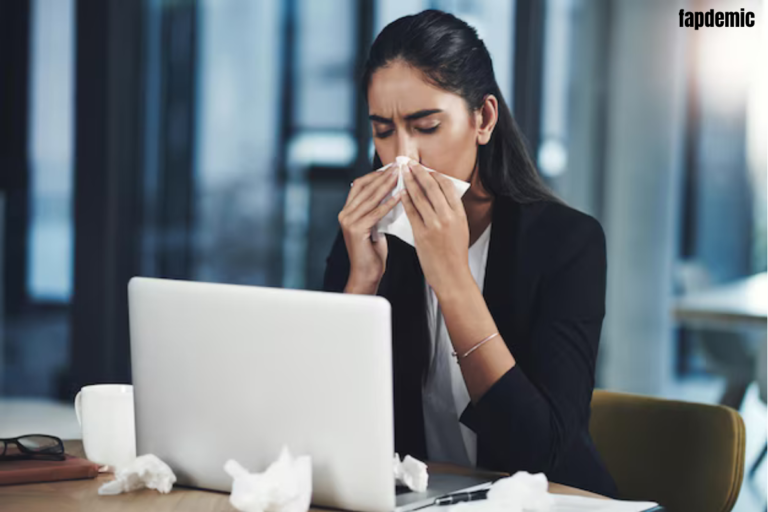Introduction to ‘Fapdemic’
Have you ever come across the term “fapdemic“? It sounds unusual and intriguing, right? Let’s break down what it actually means and why people are talking about it.
Definition and Origin of the Term
The word “fapdemic” is a combination of “fap” (a slang term for self-pleasure) and “epidemic.” The term is used to describe the idea of excessive or widespread self-pleasuring habits, often sparked by social, emotional, or even environmental factors. This term has gained popularity through internet culture and forums, where people discuss how this behavior has become more common or intense for many individuals.
The origin of the term “fapdemic” ties back to conversations around human behavior and the effects of modern-day stresses. As more people find themselves in stressful or isolated situations, the idea of a “fapdemic” has become a topic of discussion. The phrase has become a way for people to discuss serious and often sensitive issues in a humorous or relatable manner.
Overview of Its Relevance in Contemporary Discussions
Why is “fapdemic” relevant today? In our modern world, people are often more open to discussing topics once considered taboo, including self-pleasure and sexual health. Technology and social media have made it easier for such conversations to reach a wider audience. The “fapdemic” highlights the impact of our environment and habits on mental and physical well-being.
Discussions around this topic often connect with broader themes, like the effects of isolation, the pressures of modern living, and the impact of digital distractions. Understanding the concept of “fapdemic” helps people grasp how daily stressors can shape behavior and prompt conversations around self-care and well-being. This term serves as a way to understand our collective struggles in a world full of fast-paced changes and uncertainties.
Historical Context of Pandemics
Pandemics have been a part of human history for a long time. These widespread outbreaks of disease have changed societies, economies, and daily life. Some well-known pandemics include the Black Death in the 14th century, the Spanish flu of 1918, and more recently, the COVID-19 pandemic. Each of these events brought significant changes to how people lived, worked, and interacted.
Overview of Significant Pandemics in History
The Black Death, for example, wiped out a large portion of the European population and changed social structures. The Spanish flu infected one-third of the world’s population, leading to major health reforms and changes in public health awareness. In our time, the COVID-19 pandemic disrupted economies, increased mental health challenges, and changed our relationships with technology and communication.
Pandemics often lead to shifts in behavior. People become more aware of hygiene and health precautions. Societies adjust to new ways of living, like social distancing or working from home. These events can also leave lasting psychological effects, like anxiety or a greater awareness of health risks.
Understanding the ‘Fapdemic’ Phenomenon
The “fapdemic” is not a traditional pandemic caused by a virus or bacteria. Instead, it refers to the rise of excessive self-pleasure habits, often influenced by modern-day stresses, social isolation, or digital distractions. As mentioned earlier, this term combines “fap” (a slang word for self-pleasure) and “epidemic” to describe what some see as a growing and concerning trend.
Explanation of the Term ‘Fapdemic’
The “fapdemic” describes a situation where more people engage in frequent self-pleasure, sometimes as a way to cope with boredom, stress, or a lack of social interaction. The term has gained popularity, especially during times like the COVID-19 lockdowns, when many people found themselves stuck at home, dealing with anxiety and uncertainty.
Factors Contributing to Its Emergence
Several factors contribute to the rise of the “fapdemic.” One major factor is the increase in stress and isolation. People often turn to comfort habits when dealing with difficult emotions. The digital age has also made adult content more accessible than ever before, leading to a temptation that can be hard to resist. Additionally, working from home or having fewer social responsibilities can lead to habits that might have been less common in more structured environments.
Societal and Psychological Implications
The “fapdemic” has sparked discussions about mental and physical well-being. Some people worry that excessive self-pleasure can lead to feelings of guilt, a decrease in productivity, or even relationship problems. There are also concerns about the impact on self-esteem and mental health, especially when habits start to interfere with daily responsibilities.
On the flip side, there are those who argue that self-pleasure is a normal and healthy part of life. The key discussion revolves around moderation and balance. As society becomes more open about topics like sexual health, it also faces the challenge of addressing when behaviors become harmful or disruptive.
Health Implications
The “fapdemic” phenomenon has stirred concerns about both physical and mental health. Let’s explore the possible impacts this trend could have on well-being.
Physical Health Considerations
Excessive self-pleasure may lead to physical discomfort, irritation, or even more severe health problems like repetitive strain injuries if the behavior becomes too frequent. It can also affect sexual function or sensitivity over time. While moderate self-pleasure is often considered normal and even beneficial, when it becomes excessive, it might interfere with the body’s natural rhythms, causing fatigue or affecting sleep quality.
Mental Health Aspects
Mentally, the “fapdemic” can be linked to feelings of guilt, anxiety, or low self-esteem, especially if someone feels out of control or believes that their behavior is unhealthy. High stress and an over-reliance on self-pleasure for comfort can contribute to mental health struggles, like depression or social withdrawal. This behavior can also become a coping mechanism, replacing healthier ways of dealing with emotions, which may worsen feelings of isolation or unhappiness.
Long-term Effects and Potential Risks
Long-term risks might include addiction-like behaviors, where individuals feel they cannot control their impulses. This could lead to issues in personal relationships, reduced motivation, or even performance problems at work or school. Additionally, the easy accessibility of adult content may shape unrealistic expectations about intimacy, impacting one’s ability to form meaningful and healthy connections with others.
Societal Perspectives
Society’s view on the “fapdemic” is complex. Cultural, social, and media influences shape how this trend is perceived and discussed.
Cultural Attitudes Towards the ‘Fapdemic’
Cultural norms play a huge role in how self-pleasure is viewed. In some societies, discussing sexual health is still taboo, leading to mixed messages about what is normal or acceptable. Other cultures may be more open, encouraging education and healthy discussions about self-pleasure. The “fapdemic” taps into these varying attitudes, sparking debates about where the line should be drawn between healthy behavior and problematic habits.
Media Portrayal and Public Perception
Media coverage of the “fapdemic” ranges from humor to serious discussions. Some platforms treat it lightly, using humor to engage audiences, while others highlight concerns about the impact on health and relationships. The way the media frames the topic can shape public perception, either normalizing the behavior or raising alarms about its consequences. Social media, in particular, has amplified the conversation, making it more visible but sometimes less nuanced.
Ethical Considerations and Debates
The ethical debate around the “fapdemic” often revolves around personal responsibility and societal norms. Questions arise about whether the availability of adult content should be restricted or whether individuals should have more support for developing healthy habits. There’s also a broader ethical discussion about the impact of the internet and digital content on human behavior, and how much society should intervene or educate.
Preventive Measures and Solutions
Preventing or managing the “fapdemic” requires a balanced approach focused on awareness, self-care, and support.
Strategies for Individuals
For individuals who feel their habits are affecting their lives negatively, simple strategies can help. Setting boundaries, like designated times for self-care or screen breaks, can make a difference. Focusing on hobbies, exercise, or spending time outdoors can redirect energy and reduce reliance on self-pleasure. Mindfulness and stress management techniques, like meditation or journaling, can also be effective.
Role of Education and Awareness
Education plays a vital role in addressing the “fapdemic.” Open and honest discussions about sexual health, consent, and healthy habits can help reduce stigma and encourage responsible behavior. Schools and health organizations can provide resources and workshops to inform people about the physical and mental impacts of excessive self-pleasure.
Support Systems and Resources Available
Support is crucial for those who struggle with self-control or feelings of shame. Therapy, support groups, or online communities can provide a safe space to talk about challenges and find solutions. Professionals, like psychologists or counselors, can offer personalized advice and coping strategies. There are also apps and tools designed to help monitor and manage habits in a healthy way.
This comprehensive look at the “fapdemic” provides insights into the impact on health and society, while also offering practical solutions and support options for those who may be affected.
Expert Opinions and Research Findings
Experts and researchers have weighed in on the “fapdemic,” offering valuable insights and data. Understanding these perspectives can shed light on the psychological and societal impact of this trend.
Insights from Psychologists and Health Professionals
Psychologists emphasize that self-pleasure is generally a healthy and normal activity. However, when it becomes excessive, it can be a sign of underlying issues, like stress, anxiety, or loneliness. Health professionals have noted that the surge in self-pleasuring habits, especially during times of crisis or isolation, can be a coping mechanism that provides temporary relief but doesn’t address the root causes of distress. Experts recommend self-awareness and balance, stressing that moderation is key.
Summary of Recent Studies and Their Conclusions
Recent studies have explored the rise of self-pleasure habits, especially during periods of widespread isolation, such as the COVID-19 pandemic. Research has shown that stress, uncertainty, and lack of social interaction can drive individuals toward comfort-seeking behaviors, including self-pleasure. Studies also suggest that excessive habits may be linked to feelings of guilt or reduced motivation, but more research is needed to fully understand the long-term psychological and social impact. The consensus is that education and open conversations can help people navigate these behaviors in a healthier way.
Case Studies and Personal Narratives
Real-life stories provide a human side to the “fapdemic” and help illustrate its diverse impact on individuals.
Real-life Experiences and Testimonials
Many people have shared their personal experiences online, describing how self-pleasure became a way to manage boredom or stress, especially during long periods of isolation. Some individuals talk about how their habits spiraled out of control, affecting their productivity or relationships. Others share stories of how they managed to regain balance by setting boundaries and focusing on self-care. These narratives show that the “fapdemic” has a varied impact, depending on personal circumstances and mental health.
Analysis of Patterns and Common Themes
Several common themes emerge from these stories. Isolation, stress, and easy access to adult content are frequently mentioned as triggers. People also discuss feelings of guilt or shame, along with the struggle to break free from habits that have become compulsive. Patterns show that while some people can easily return to normal routines, others may need more structured support or guidance.
Global Perspective
The “fapdemic” is not just a localized issue. It has different impacts and cultural meanings around the world, making it a global phenomenon.
Comparison of the ‘Fapdemic’ Across Different Cultures
Cultural views on self-pleasure vary greatly. In more conservative cultures, discussions around this topic are still taboo, which can make individuals feel more shame or isolation. In more open cultures, there is a greater emphasis on education and healthy practices, which can reduce the stigma and promote balance. The “fapdemic” phenomenon also highlights differences in how societies address sexual health and well-being, reflecting diverse values and beliefs.
International Responses and Initiatives
Some countries have launched initiatives to promote sexual health awareness, focusing on education and open conversations. In others, stricter regulations around adult content have been put in place in an attempt to curb excessive behavior. International health organizations emphasize the importance of understanding the root causes of behavior, such as mental health and access to resources, rather than simply addressing the symptoms.
Future Outlook
What does the future hold for discussions around the “fapdemic”? Experts and advocates are exploring new approaches to manage and understand this trend.
Potential Trends and Developments
As society becomes more open about topics related to mental health and self-care, there is hope for more honest conversations and better resources. Technology may continue to play a significant role, with apps and tools designed to help people manage habits and promote healthier behaviors. Additionally, research into the impact of digital content on human behavior is expected to grow, giving us more data to inform future solutions.
Recommendations for Addressing the Phenomenon
Experts suggest a multi-faceted approach to tackling the “fapdemic.” This includes better mental health support, more accessible education about sexual health, and encouraging open, non-judgmental discussions. People are advised to be mindful of their habits, seeking professional guidance if needed. Communities and health organizations are encouraged to work together to provide the resources and support that individuals may need.
Conclusion
The “fapdemic” is a complex phenomenon that brings together issues of mental health, societal behavior, and the influence of modern technology. It serves as a reminder of how quickly our habits can be affected by external stressors like isolation, anxiety, or the accessibility of digital content. While self-pleasure is a normal part of life, understanding when it becomes excessive or harmful is crucial for maintaining a healthy balance.
Moving forward, open conversations and education will play a vital role in addressing this trend. By promoting awareness, reducing stigma, and offering support, society can help individuals make informed choices about their well-being. The future calls for a compassionate and well-informed approach, where the emphasis is on understanding behavior, providing resources, and encouraging healthy practices.


